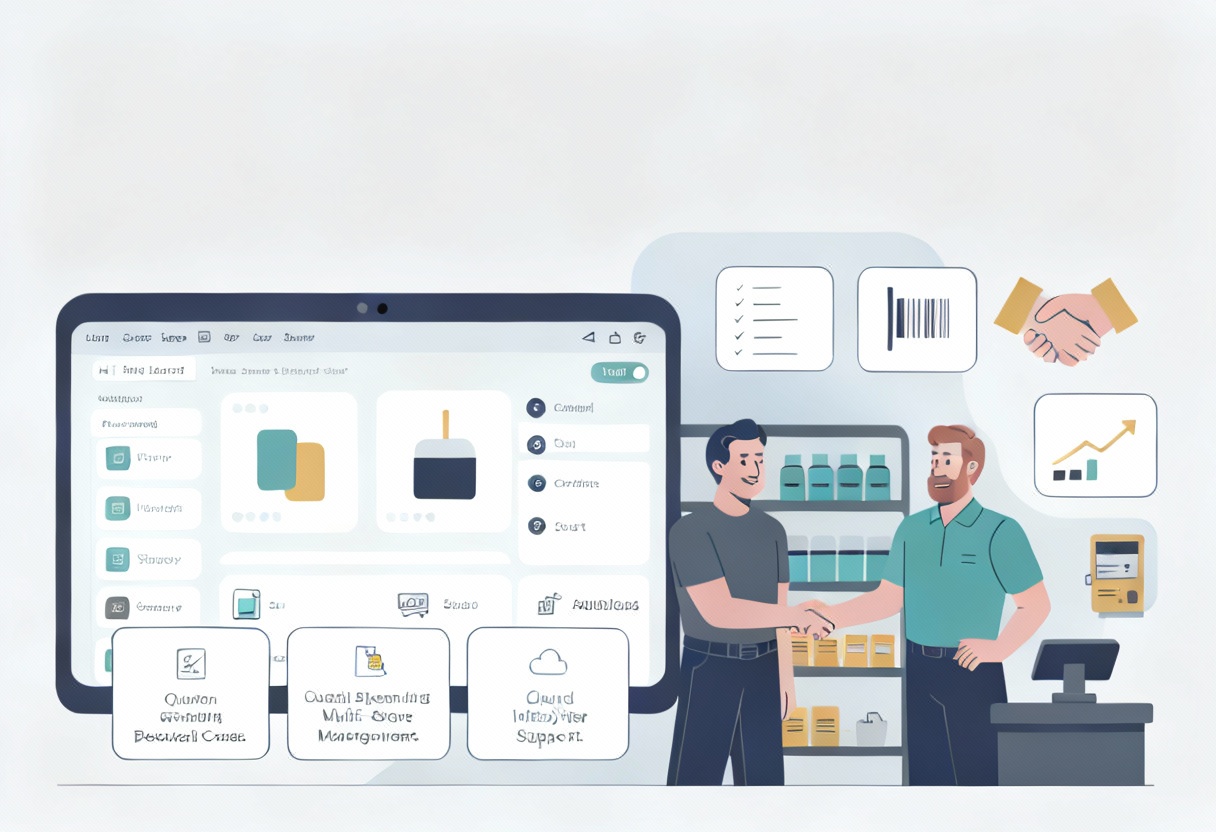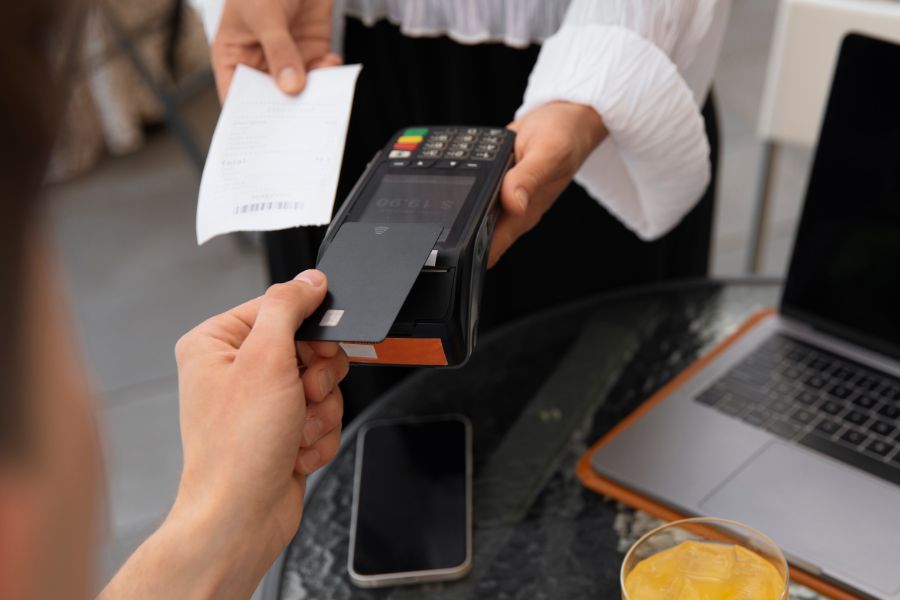A white-label POS reseller gives businesses the chance to sell proven POS technology under their own brand. Instead of spending years building software, resellers focus on revenue and customer relationships while vendors handle the backend. This ConnectPOS guide will explain how the model works, why it is growing, and what benefits it brings.
Highlights
- White label POS reselling is a fast-growing model that lets businesses rebrand proven POS systems and sell them as their own.
- Resellers gain long-term recurring income from subscription models while focusing on sales, marketing, and customer success instead of technical development.
- Success depends on choosing reliable vendors, clear pricing, and strong branding flexibility, ensuring resellers build loyalty and scale across industries.
What Is a White Label POS Reseller?
A white label POS reseller takes an existing point-of-sale system and rebrands it as their own. The system is built, tested, and maintained by a vendor, but in the eyes of the end customer, it belongs entirely to the reseller. From the logo and interface to the domain and mobile apps, everything carries the reseller’s identity.
That shift mirrors a broader market pattern in which platforms and marketplaces already account for roughly 30% of global consumer purchases, especially among SMEs that lean toward integrated, private-label-style software experiences.
The model works because responsibilities are divided. The vendor manages backend infrastructure, security, and product updates. The reseller handles client-facing duties such as sales, onboarding, and first-line support. This split allows businesses to act like full software providers without spending years on development.
It differs sharply from standard reselling or referral programs. Traditional resellers often sell another company’s branded POS, which strengthens the vendor’s brand rather than their own. Referral models usually provide only one-time commissions with little customer ownership. White labeling changes the dynamic. Resellers keep control of the customer relationship, pricing, and long-term income streams, while still relying on the vendor’s technical backbone.
For merchants, it feels like buying from a trusted local provider. For resellers, it means building a recognizable brand and recurring revenue without the delays of product creation.
Why White Label POS Reselling Is Growing
Retailers, restaurants, and niche businesses are demanding smarter POS systems than ever before. Customers want speed, flexibility, and tailored experiences, which means merchants need technology that fits their exact needs. Instead of spending years building a system, resellers can meet that demand instantly through a white label POS reseller model.
The urgency is visible in payments data: in the euro area, non-cash transactions rose 7.4% year over year in the first half of 2024 to 72.1 billion, with cards making up 56% of all non-cash payments. This pressure pushes merchants toward next-gen POS.
The subscription-based nature of POS software also makes this model attractive. Instead of one-time sales, resellers gain predictable monthly or yearly income. Every transaction, every update, and every service tier becomes part of a steady revenue stream. That consistency is what many entrepreneurs and agencies are looking for, especially in markets where competition is tight.
To see the scale, Forbes expects the subscription economy to reach about $1.5 trillion in 2025. In the POS sector, Toast reported $1.9 billion in annual recurring revenue in Q2 2025, which is a 31% increase compared to last year. This shows how strong the recurring revenue trend really is..
►►► Optimal solution set for businesses: Multi store POS, Next-gen POS, Inventory Management Software (MSI), Self Service, Automation, Backorders
Another reason for growth lies in the human side of the business. Merchants often prefer dealing with a brand they know locally, not a distant software provider. A reseller who rebrands the POS builds trust, provides faster responses, and becomes the face of support. Over time, that trust translates into loyalty, referrals, and stronger retention.
This combination of high demand, recurring revenue, and personal branding explains why the model is gaining momentum worldwide. It is not just a shortcut to market entry; it is a long-term path for building sustainable business value.
Read more: POS White Label vs POS Reseller: Which Is Right for Your Business?
Key Benefits of Partnering with a White Label POS Reseller
Working with a white-label POS reseller is more than a shortcut to market. It creates lasting business advantages that strengthen both revenue and customer trust. We’ll show you the key benefits that make this model worth considering.
Faster go-to-market: no need to build from scratch
Building a POS system from the ground up can take years of coding, testing, and refining. During that time, competitors move ahead and capture market share. A white-label POS reselling partnership eliminates that delay.
Speed is important because the small business digitization market is expanding quickly. McKinsey estimates that the digitization and cloud market for SMBs in North America and Europe is worth 84 billion euros and is growing by more than 20% each year until 2026. That growth gives the biggest rewards to those who can launch quickly.
You start with a proven, fully functional platform that’s ready for rebranding. Instead of sinking resources into development, you focus on sales and customer growth. ConnectPOS clients, for example, often launch under their own brand in weeks rather than years, giving them a head start in fast-moving markets.
Lower upfront costs and reduced risk
Software development requires massive upfront investment in talent, infrastructure, and maintenance. For many resellers, those costs are impossible to recover quickly. Partnering with a reseller setup cuts that burden sharply. The vendor carries the weight of system updates, compliance, and server upkeep.
Resellers only pay licensing fees or revenue shares, which are far easier to manage. This lowers financial risk while still granting access to enterprise-grade technology. In short, the model protects budgets while keeping revenue opportunities wide open.
Recurring income from subscriptions and add-ons
One-time sales may look attractive, but they lack sustainability. The white label POS reseller model turns every client into a recurring revenue source. Merchants typically pay monthly or annual fees, and resellers can expand income through add-ons like hardware, integrations, or loyalty modules.
This creates a compounding effect: the longer customers stay, the more predictable revenue becomes. ConnectPOS partners regularly report stable growth from subscriptions, which cushions their business against seasonal dips. In practice, that steady cash flow provides security and fuels reinvestment.
Brand ownership and stronger customer loyalty
Selling another company’s product often means your brand fades into the background. Reselling POS under your brand flips that dynamic. Customers see your logo, your domain, and your identity at every touchpoint. That branding builds loyalty and makes your business the trusted face of technology. Research from Edelman shows that 60% of consumers decide to buy or skip a brand based on its values. That trust directly supports the reseller’s brand.
When clients associate positive experiences with your brand, they return, renew, and recommend. ConnectPOS partners often highlight how rebranding strengthens credibility and creates deeper, long-term customer relationships. Studies from Harvard Business Review show that even a 5% increase in customer retention can raise profits by 25% to 95%.
Vertical-specific solutions (retail, F&B, cannabis, etc.)
Different industries demand different workflows, from table management in restaurants to age checks in cannabis shops. A white label POS reseller partnership allows resellers to tailor solutions for each niche.
Vendors like ConnectPOS already build vertical-focused modules, so resellers can adapt quickly without coding from scratch. This specialization turns generic software into a targeted solution that feels custom-made. You can target Retail POS, Grocery & Supermarket POS, Apparel POS, Home & Furniture POS, Electronics Store POS, Vape POS, and Cannabis POS POS with solutions that feel built for each sector. The result is higher satisfaction among clients who see the system as designed for their exact business needs.
Focus on sales and support instead of tech development
Technical development consumes time, money, and constant monitoring. Resellers who partner with this approach avoid those distractions. Instead of debugging software or managing compliance, they can devote resources to marketing, onboarding, and support. This shift makes daily operations simpler and sharper.
Businesses that work with ConnectPOS often point out how freeing it feels to spend energy on client growth rather than back-end coding. It keeps teams productive and focused on what drives revenue.
Scalability with vendor-managed infrastructure
Growth often exposes the limits of homegrown systems. A white label POS reseller relationship solves that issue by relying on vendor-managed infrastructure.
As customer numbers increase, the platform scales automatically without major investment from the reseller. Updates, security patches, and server capacity expand as needed. This flexibility allows businesses to grow without bottlenecks or extra costs.
ConnectPOS, for example, supports resellers handling hundreds of stores, proving how vendor-backed scalability removes barriers to long-term expansion.
How to Work with a White Label POS Reseller?
Success in this model depends on more than simply signing a contract. Resellers need a structured approach that balances strategy, branding, and customer care. The steps below show how to work effectively with a white-label POS reseller and build a business that lasts.
- Do market research and pick your target niche: Study industries like retail, restaurants, or cannabis. Each has unique pain points, and focusing on one niche helps you stand out.
- Evaluate vendors: Check uptime records, update schedules, and compliance standards. Strong branding flexibility is also key, so you can put your name front and center.
- Negotiate terms: Go beyond pricing. Look at margins, service-level agreements, training, and onboarding resources. These factors shape the reseller experience as much as cost.
- Create pricing models and bundle services: Structure your plans to include hardware, support, or consulting. Bundling creates more value and keeps clients tied to your brand.
- Build marketing assets: Develop a dedicated website, branded demos, and sales kits. These materials give prospects confidence that they’re buying from a credible provider.
- Plan customer onboarding and support flow: Make sure clients have a clear path from setup to daily use. Training videos, documentation, and help channels strengthen trust.
- Collect feedback and loop it back: Regularly gather client input and share it with your vendor. This cycle improves the system and keeps your brand aligned with user needs.
Working with a POS software reseller is a long-term play. The more structure you put in place early, the stronger your reputation and recurring revenue will become.
Read more: 6 Top White Label Software Companies in 2026
Common Pitfalls to Avoid
Partnering with a white-label POS reseller can unlock new opportunities for growth, but rushing in without caution often leads to setbacks. Many businesses lose time and money by overlooking details that seem minor at first but cause major problems later. Being aware of common pitfalls helps resellers avoid costly mistakes.
- Choosing an unreliable vendor with poor support: A partner with weak infrastructure or slow support damages your reputation. Clients will blame you, not the vendor.
- Limited customization flexibility: If branding options are shallow, your product will look like every other reseller’s. Deep customization keeps your brand unique and memorable.
- Unclear pricing models or hidden costs: Vendors that hide extra fees cut into your margins. Always demand transparency to keep your business profitable.
- Weak onboarding and training support: Without proper training tools, your clients will struggle to adopt the system. Smooth onboarding sets the tone for long-term retention.
- Ignoring compliance, data security, and regulations: Payment systems deal with sensitive data. Overlooking PCI-DSS standards or local laws risks fines and customer trust.
Avoiding these traps requires discipline and due diligence. When resellers vet their partners carefully and plan for long-term operations, they protect their brand and secure steady growth.
ConnectPOS: Your Strong White Label Partner for Success
ConnectPOS gives resellers a ready-to-sell POS system that’s flexible, scalable, and built for branding. You put your name on the platform while we handle the technical foundation, updates, and support. That way, you focus on building relationships, growing revenue, and standing out in your market.
Key advantages and features you gain with ConnectPOS white label:
- Full Branding Control: Rebrand the interface, domain, logo, and even mobile apps with your identity.
- Omnichannel POS: Sync sales across online and offline channels in real time. Works with Shopify, Magento POS, WooCommerce POS, BigCommerce, and more.
- Multi-Store & Multi-Warehouse Management: Centralize inventory, transfers, and reporting across unlimited stores or warehouses with robust inventory management software.
- Real-Time Synchronization: Products, orders, customers, and promotions update instantly, reducing errors and delays.
- Offline Mode: Keep selling even if the internet drops. Transactions sync automatically when back online.
- Advanced Checkout: Fast transactions with barcode scanning, customizable checkout, split payments, loyalty points, and discounts.
- Mobile POS: Sell anywhere with Android/iOS apps, tablets, or mobile devices. Great for pop-ups, events, or on-the-go retail.
- Custom Pricing & Discounts: Set customer-specific pricing, B2B bulk discounts, tax rules, and promotions with a Custom POS approach.
- Inventory Accuracy: Multi-source inventory, batch control, and demand forecasting to keep shelves stocked.
- Hardware Compatibility: Works with receipt printers, cash drawers, scanners, card readers, and customer-facing displays.
- Payment Flexibility: Support for multiple gateways, currencies, and payment options (including QR codes and self-checkout).
- Customer Management & Loyalty: Store customer profiles, purchase history, loyalty points, and digital receipts for retention.
- Reports & Analytics: Detailed sales, staff performance, and inventory reports accessible in real time.
- Third-Party Integrations: Open API connects with ERP, CRM, accounting tools, and marketplaces.
- Scalability: Add unlimited merchants or verticals without heavy overhead. Designed to grow with your reseller business.
- Training & Onboarding Support: Reseller kits, sales documentation, and dedicated support to help you succeed.
- Compliance & Security: PCI-DSS compliance, secure transactions, GDPR-ready data handling.
- Vertical-Specific Solutions: Pre-built for retail, fashion, supermarkets, F&B, vape shops, furniture, cannabis, and more.
Resellers worldwide already trust ConnectPOS, with 200+ partners and 12,000+ merchants using the system. It’s a proven platform where you own the brand, pricing, and client relationships, while we take care of the complex backend.
FAQs: White Label POS Resellers
1. What’s the difference between a reseller and a referral partner?
A reseller rebrands and sells the POS as their own, while a referral partner only passes leads and earns one-time commissions.
2. How much does it cost to become a white label POS reseller?
Costs vary by vendor, but most require licensing fees or revenue-sharing models. Some also include onboarding, training, or hardware-related expenses.
3. Can I customize the system to match my niche market?
Yes. White label POS platforms allow branding, domain control, and tailored modules so you can adapt the system for specific industries or customer groups.
4. How do recurring revenues work in this model?
Most white label POS systems run on subscription pricing. Resellers collect recurring income from merchants, often adding extra services for higher margins.
5. What industries benefit most from white label POS?
Retail, restaurants, cannabis shops, salons, supermarkets, and other niche markets benefit from localized, branded POS systems tailored to their daily operations.
6. How long does onboarding usually take?
Onboarding typically takes a few days to a couple of weeks, depending on the vendor’s resources and the complexity of the client’s setup.
7. Is data security managed by the vendor or reseller?
Vendors usually manage core security and compliance, while resellers oversee customer relationships and ensure local regulations are respected.
Final Thoughts
Working with a white label POS reseller gives businesses a faster path into software sales, recurring income, and stronger customer relationships. The model provides resellers with a chance to build a recognizable brand while leaving the technical burden to the vendor.
The key is choosing a reliable partner that supports long-term growth. ConnectPOS stands out as a trusted solution, combining full branding control, omnichannel flexibility, and proven global adoption. For resellers ready to expand their portfolio and grow recurring revenue, ConnectPOS is the partner built for success. Contact us today to start your white label journey.
►►► Optimal solution set for businesses: Shopify POS, Magento POS, BigCommerce POS, WooCommerce POS, NetSuite POS, E-Commerce POS



